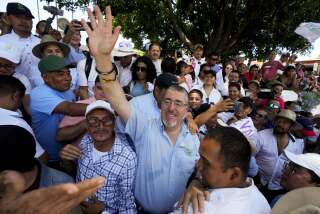Americans Want Reforms in Manila--but What Kind? : Philippines: U.S. experts disagree on the causes of the latest rebellion. And they differ on what urgent advice to offer Aquino.
- Share via
WASHINGTON — At the beginning of this century, when the United States acquired the Philippines from Spain, humorist Finley Peter Dunne summed up the American attitude toward its first overseas territory.
“We propose f’r to l’arn ye the uses of liberty,” Dunne wrote, as the fictitious Mr. Dooley. “We can’t give ye any votes . . . but we’ll threat ye th’ way a father shud threat his childern if we have to break ivry bone in y’er bodies.”
Now, after 90 years and numerous unheeded warnings, it’s lesson time again for the Philippines.
In the wake of the latest attempted coup attempt against Philippine President Corazon Aquino, U.S. policy-makers, analysts and Congress members are saying that the United States should send an urgent message to Aquino to quickly reform her leadership style and her government.
But what, exactly, does the United States want Aquino to do?
When it comes to specifics, there is little agreement in Washington on what sort of changes the Bush Administration should seek in order to bolster the Aquino government and protect America’s strategic interests in the Philippines.
Experts inside and outside the U.S. government disagree both on the root causes of the attempted coup and on the lessons to be learned from it.
Some say the top priority is for Aquino to crack down on the military, to arrest, prosecute and imprison the officers who sought to seize power.
“She’s got to go after these guys, jail them for life, something for real,” said a staff member of the House Foreign Affairs subcommittee on Asia. “None of these 100-push-ups kinds of punishments.”
Others express sympathy with the coup leaders, arguing that their actions reflect deep-seated grievances in the Philippine armed forces that Aquino must try to answer.
Many U.S. experts maintain that President Bush should goad Aquino to move faster on social reforms. Those most frequently mentioned are a drive against corruption and a serious program of land reform, one that would break up huge tracts like Aquino’s family estate, Hacienda Luisita.
On the other hand, Richard Fisher, an Asia specialist at the Heritage Foundation, argues that one of the urgent messages the Bush Administration should give Aquino now is that her modest, limited program of land reform has already gone too far.
“Land reform should be scaled way back,” Fisher said. “It’s shaping up to be a real boondoggle. It’s clear to me that in some areas of the Philippines, like (the island of) Negros, land reform will chase away not only the hacienda owners but the rural middle class.”
The one thing the Washington experts seem to agree on is that the attempted coup and Aquino’s panicky request for U.S. warplanes to defend her government were extremely damaging, both to Aquino’s political future and to the United States.
Some U.S. specialists are comparing the situation to the problem the Reagan Administration confronted with then-President Ferdinand E. Marcos five years ago.
In 1984 and 1985, the Reagan Administration concluded that Marcos was in deep trouble and that unless he made quick changes, a Communist insurgency might succeed. A parade of U.S. emissaries were sent in an unsuccessful effort to promote reform.
After Marcos fled the country in 1986 and Aquino came to power, the Reagan Administration eventually found itself urging changes upon the new president. The U.S. warnings to Aquino became a crescendo after an unsuccessful coup attempt in August, 1987.
The 1987 attempt touched off a debate within the U.S. government that continues today. Pentagon officials argued then that military rebels had legitimate grievances.
“The abortive coup . . . highlighted a number of grievances that had been building in the Philippine armed forces since the February, 1986, revolution,” Karl D. Jackson testified. Jackson, then a deputy assistant secretary of defense, is now Bush’s top national security adviser for Asia.
Among the grievances, he said, were “the expectation of many Philippine military personnel that the departure of Marcos would rapidly improve the condition of the armed forces, elevate its status in Philippine society, and, above all, concentrate government efforts on . . . the festering Communist insurgency.”
Now, many U.S. analysts are citing these same military grievances--along with popular discontent over corruption and poor delivery of services by the Aquino government--as the underlying cause of the latest coup attempt.
But Aquino’s defenders insist that the military grievances are irrelevant and that the Philippine rebels deserve no sympathy.
“This is a straight power struggle,” said a staff member of the House subcommittee on Asia, whose chairman, Rep. Stephen J. Solarz (D-N.Y.), has been among Aquino’s staunchest supporters in Washington. “The fact that (the rebels) launched a coup attempt does not mean Aquino is to blame. How does overthrowing a constitutional government help the Philippines’ economic problems?”
U.S. officials and scholars say that however weakened Aquino’s political position may be, the Bush Administration will continue to support her.
“She’s the only horse we’ve got--worse for wear, but the only horse,” the Heritage Foundation’s Fisher said. “A military junta would soon deteriorate and open the path toward a coalition government with the Communists, which the Communists would soon consume.”
More to Read
Sign up for Essential California
The most important California stories and recommendations in your inbox every morning.
You may occasionally receive promotional content from the Los Angeles Times.













